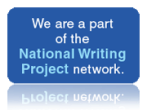The End of the School Year Approaches By Janice Ewing
The approaching end of the school year is often a time for reflection. For many teachers, this has been and continues to be a year filled with local, national, and world events that challenge our basic understanding of humanity and of our role as teachers. In this context, I believe that reflection is of more value than ever, as we pause to look back and ahead. We might consider:
What worked well, what we would do differently?
What new opportunities and challenges might the new school year bring?
What elements of change are within our control?
For goals that don’t seem to be in our control, what are our options to attain them, or work around them?
If we’re advocating for change, at any level, what form can that take?

In that spirit, here are some areas of reflection that educators might want to explore, individually or within partnerships or groups:
Physical arrangement of classroom
How did the layout of my classroom work for my students and for me? If you made changes to the physical organization of your space during the school year, what effects did they have? What do you want to keep the same for the next school year? What do you want to change, and what do you need to do to accomplish that?
Relationships with students
What were some positive aspects of your students’ interactions with you and with each other? What did not go well? Did you make changes to increase the quality and quantity of interaction with and among students during the school year? What were the effects of those changes? What are your goals for next year in this area?
Relationships with faculty and staff
Did you have supportive, collegial or mentoring partnerships with other adults at your school? If so, how can you deepen those relationships? How might you begin to develop them if they were lacking, or look to a larger educational community for sustenance?
Relationships with parents and larger community
How did you connect with the adults in your students’ lives? What have you learned about the community in which you teach? How might you learn more, or interact more authentically?
Curriculum and teaching strategies
What aspects of your content, strategies, and pacing were most and least effective this year? What would you like to do differently next year? What can you do to bring about those changes?
Reflection on practice
Were you able to reflect on your practice in a way that was helpful and sustainable? If so, how might you deepen that practice? If not, consider how reflection might be of value, and what might be a realistic way to integrate it into your day or week.
Overall sense of agency and integrity as a teacher
Whatever your specific challenges were, to what degree did you feel that you were the author of your teaching story? How closely were you able to align your teaching with your beliefs about education?
What patterns are emerging as you reflect on these questions? You might want to do some journaling or graphic representation about what you see. Then perhaps continue with goal-setting for next year. Who can serve as a mentor, coach, or supportive colleague? What resources might you want to explore over the summer? What actions do you need to take? What types of experiences do you want to have over the summer to replenish your spirit? Picture yourself on the first day of the new school year. Who do you want to be? How do you want to be? What do you need to do to move closer to that goal?
Janice Ewing is a 2004 Fellow of the Pennsylvania Writing and Literature Project, now the West Chester Writing Project, and a current member of the advisory board. Her interests include teacher inquiry, collaboration, and mentoring. She and her colleague Dr. Mary Buckelew, are the authors of Action Research for English Language Arts Teachers: Invitation to Inquiry (Routledge, 2019).



